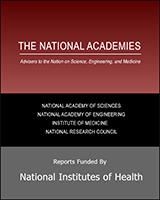NCBI Bookshelf. A service of the National Library of Medicine, National Institutes of Health.
Institute of Medicine (US), Roundtable on Environmental Health Sciences, Research, and Medicine. Global Environmental Health in the 21st Century: From Governmental Regulation to Corporate Social Responsibility: Workshop Summary. Washington (DC): National Academies Press (US); 2007.

Global Environmental Health in the 21st Century: From Governmental Regulation to Corporate Social Responsibility: Workshop Summary.
Show detailsThe Institute of Medicine’s Roundtable on Environmental Health Sciences, Research, and Medicine was established in 1988 as a mechanism for bringing various stakeholders together to discuss environmental health issues in a neutral setting. The members of the Roundtable on Environmental Health Sciences, Research, and Medicine come from academia, industry, and government. Their perspectives range widely and represent the diverse viewpoints of researchers, federal officials, and consumers. They meet to discuss environmental health issues that are of mutual interest (though sometimes very sensitive). The basis of these discussions illuminates both current and emerging issues for the field of environmental health.
There is a growing awareness of significant environmental health issues, both domestically and worldwide. Scientists and policy makers are grappling with complex issues such as climate change, sustainability, and obesity—a diverse set of challenges that continue to have health impacts. Meeting these challenges requires dialogue from a number of stakeholders. The problems did not come from one activity, and the solutions are not going to come from one source (e.g., government or academia). Government alone clearly does not have the financial and other resources to solve all the health-related problems. Further gains in environmental health are going to be met through collaborations and partnerships. This does not mean that each stakeholder group needs to play a role in every problem, but we need to move forward collectively. This has been more apparent as disasters such as the tsunami in Indonesia, hurricanes Katrina and Rita in the Gulf Coast, and SARS. There is a need for stakeholders to bring their expertise to the table.
In this workshop, the Institute of Medicine’s Roundtable on Environmental Health Sciences, Research, and Medicine discussed the role of industry in environmental health. The workshop looked at programs that work in concert with governmental regulations and tried to focus on how these programs can improve environmental health. One point that was made a number of times during the workshop is that we are going to need these programs at the global level. They are needed because of the complexity of the societal problems; and in order to begin to address these issues, we are going to need input from all stakeholders.
During the workshop, the Roundtable members, speakers, and participants focused some of their attention on the complexity of the management of chemicals. Each stakeholder group echoed the need for a sound management system, but the discussion focused on the details of the current and proposed systems for managing the use of chemicals in commerce. The challenge for any government entity is that over 70,000 chemicals are in use today. Understanding the potential health and environmental effects is a challenge for a developed country and not possible for developing countries that lack financial resources.
As one speaker noted, regulations can spawn innovation. Thus it is clear that regulations are an important and necessary part of the plan to improve environmental health. However, regulations are only one part of the picture. There are many limitations to relying solely on governments and regulations. First, governments are limited to their own jurisdiction. On an international arena, there is reliance on treaties and agreements, but they are often difficult to enforce. Second, many governments lack the resources to continue to make gains in environmental health. Developing countries often do not have a stable government or tax base. Even developed countries have competing interest for the tax funding that makes funding of health projects infeasible. Finally, regulations take time to implement and do not incentivize companies to exceed the regulatory standards.
This is especially true for the business community which has a global reach that transcends political boundaries. In this workshop, the Roundtable on Environmental Health Sciences, Research, and Medicine looked at some of the programs and challenges for engaging industry through the shareholders’ call for social responsibility.
This summary captures the presentations and discussions of the workshop. The views expressed in this report are those of individual speakers and participants, and do not necessary reflect the views of the Institute of Medicine, the members of the Roundtable on Environmental Health Sciences, Research, and Medicine, or the sponsors of this activity.
Paul G. Rogers
Roundtable Chair
- Preface - Global Environmental Health in the 21st CenturyPreface - Global Environmental Health in the 21st Century
- vt11a06.x1 Barstead mouse myotubes MPLRB5 Mus musculus cDNA clone IMAGE:1162738 ...vt11a06.x1 Barstead mouse myotubes MPLRB5 Mus musculus cDNA clone IMAGE:1162738 3', mRNA sequencegi|4600487|gnl|dbEST|2409873|gb|AI5 .1|Nucleotide
Your browsing activity is empty.
Activity recording is turned off.
See more...